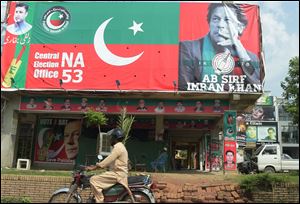
Pakistan's civilian-military gap
8/5/2018
A Pakistani motorcyclist rides past a billboard featuring an image of Imran Khan, head of the Pakistan Movement for Justice party, a day after the general election in Islamabad on July 26.
The line about 18th-century Prussia under Frederick II — it’s “not a country that has an army, it’s an army that has a country” — has been accurately applied to Pakistan since its creation in 1947.
Born in the crucible of violent partition with India, the Islamic Republic of Pakistan has always been on war footing. The military, either by design or default, became the nation’s most powerful institution, with primary influence over foreign policy and the national economy, as well as an instrument of social mobility.
Click here to view more Blade editorials
It should therefore come as no surprise to see that the man about to become Pakistan’s prime minister, Imran Khan, is ascending to the position with the help of the military and intelligence establishment. Last month’s parliamentary elections were not a pristine affair. Accusations of vote-rigging and unfair play are to be believed.
But Mr. Khan, who launched his political party in 1996 and has been an active politician since, can also claim genuine popular support across the nation. That is no small feat, given the mosaic of clans and tribal loyalties that define Pakistan.
Mr. Khan, 65, is a celebrity with real-life accomplishments to boot. He he was one of the great cricket players in the history of the game. Raised in relative privilege, he graduated from Oxford and became a fixture in the London nightclub scene in his youth. These details serve as a counterbalance to his current profile: pious, dedicated to his people and country, determined to tackle the endemic corruption of the civilian government.
His star power and comfort level on an international stage could be a great asset to Pakistan — which might soon require another multibillion-dollar bailout from the International Monetary Fund.
The open question is whether Mr. Khan’s charisma will be a balm for Pakistan’s tortured relationship with the United States. Right off the bat, probably not.
He’s long carried the nickname “Taliban Khan” for his sympathies for the Taliban movement. That may be a result of their shared Pashtun heritage — or, more likely, a strategic affection he shares with the Pakistani military, which has not-so-secretly given aid and comfort to the terrorist actors that menace neighboring Afghanistan and kill U.S. and NATO soldiers. At the same time, the upper echelons of Pakistan have winked at the CIA’s lethal drone attacks along the Afghan border, which eventually helped quell the domestic terror movement. Looking for moral consistency in the U.S.-Pakistani saga is a fruitless quest.
The previous prime minister, Nawaz Sharif, is cooling his heels in a Rawalpindi prison, laid low by corruption charges. They may be valid but resemble getting a ticket for jaywalking in Downtown Toledo — everyone does it. He just didn’t play well with The Boys, as the Pakistani officers are colloquially known.
Mr. Khan stands a better chance of bridging the civilian-military gap and heading off the chance of a coup, which would only damage Pakistan’s international standing and set back the chances for realizing its potential. While the nuclear-armed nation of 200 million has enormous problems of poverty and chaos, it also has key assets of a strategic location, an ingenious educated class and a certain audacity that keeps it in the center of world events.
If Mr. Khan can play ball with the rest of the world, he might be the right man at the right time.